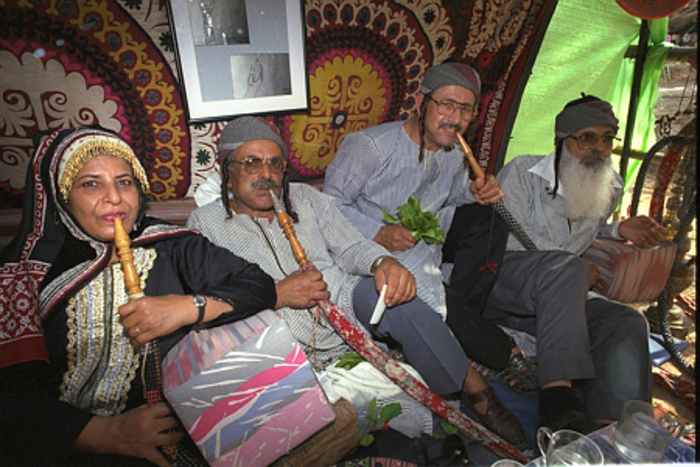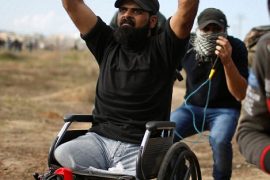The basic premise of a 3100 word op-ed in the Independent (“‘No one talks about this’: The plight of black people in the Middle East”), that most Israelis are “white” and that racism in the country, therefore, mirrors that of the US, is flatly untrue.
The op-ed (paywall), by David Swift and Michal Huss (the latter of whom is associated with the fringe group Na’amod, British Jews Against the Occupation) focuses on Israeli racism in the context of the “global debate on anti-black racism”. The op-ed repeatedly contrasts the treatment of black Israelis with that of “white Israelis”.
However, as we documented in response to a previous Indy op-ed making a similar assertion, most Israeli citizens are in fact people of colour – in that they are either Mizrahi (Jews of Middle Eastern or North African descent) Ethiopian or Arab. And, even if we were to focus only on Jews, a strong plurality of Jewish citizens are Mizrahi, not Ashkenazi (Jews from Europe).

Israel is NOT a ‘white’ nation. Indeed, those who live here know that the average Israeli looks a lot more like Kamala Harris than Joe Biden.
Though the op-ed devotes some space to discussing discrimination against African asylum seekers, it largely addresses the Ethiopian-Israeli experience – and, in doing so, promotes several misleading or false claims.
After arguing that, “as in the United States, police violence against black [Israelis] is becoming a more prominent issue”, an Ethiopian Israeli activist is quoted thusly:
“[As an Ethiopian] you’re always under suspicion. Everywhere you go that is not your ghetto, that is not your neighbourhood, you are always under suspicion. If you go to white neighbourhoods you are going to be arrested or questioned by police officers. My young brothers, when they walk around, they would never walk around without ID. For white Israelis, this would never cross their minds, the obligation to always have ID.
It is simply not true that, for “white Israelis”, it “would never cross their minds” to carry their national ID. In fact, all Israelis are legally required to carry their ID (Teudat Zehut) with them at all times. Indeed, anyone who lives in Israel would know that it’s something you carry around in your wallet – in the same way, for example, that Americans carry around their driver’s license. The Israeli ID serves as a way for police, government authorities and, far more often, retailers to identitify you.
The op-ed then cites a putative example of Israeli racism – which is tied to police brutality in the US.
As in the United States, police violence against black people is becoming a more prominent issue. Yerday says it is “something that we deal with with a vengeance since 2015, following the death of Yosef Salamsa who was arrested by the police, and when his parents arrived at the station they found him lying on the floor outside the station handcuffed and badly beaten. A few months later he was found dead. Police during these months harassed the family and he became really depressed and the family does not believe this is a suicide case.
However, even the Israeli left activist site +972 doesn’t dispute the conclusion that Salamsa took his own life. The only controversy involves the claim that a prior encounter with police, where Salamsa was tasered during a violent incident, led to him to depression and his suicide months later.
Claims of alleged police brutality and even murder continue:
In 2019 two Ethiopians were shot and killed by police: Yehuda Biadga in the town of Bat Yam and Solomon Teka in Haifa. “Time and time again we go and protest about these issues,” says Yerday.
Whilst there is a trial under way regarding the highly questionable killing by police of Yehuda Biadga, in the case of Solomon Teka, no serious questions have been raised regarding the fact he was shot lawfully as he lunged at officers with a knife – after ignoring warnings to stop. As Times of Israel reported, the incident occurred when his family called police after Teka, who had mental health problems, threatened them with the same knife he tried to use against police.
Though there is no question that Israeli citizens of Ethiopian descent face discrimination, the (literal) black and white framing of the issue of alleged people brutality against Ethiopians, which is clearly designed to evoke recent racial tensions in the US, is, as we demonstrated, egregiously misleading.
Indeed, tellingly, the word “Mizrahi” is never used in the piece, and this dominant group of Israeli Jews of colour is only alluded to once, in this sentence:
Generally speaking, Arab Jews and immigrants from the former Soviet Union tend to support right-wing parties such as Netanyahu’s Likud, which Ethiopians have historically supported, although this may be changing
Yet, as Lyn Julius, co-founded Harif, an association of Jews from the Middle East and North Africa, has explained, the term “Arab Jews” is a highly politicised and propagandistic term – one that’s typically rejected by those its applied to. Julius wrote that “Communists and anti-Zionists have long argued on behalf of an ‘Arab Jewish’ identity as a way of repudiating Jewish nationalism and justifying their participation in revolutionary politics”. It presupposes, she added, “that Arabs and Mizrahi Jews are natural allies, and that both are victims of [white] Ashkenazim.”
Throughout the Indy op-ed, the term “white Israelis” is used in a context suggesting that all Israeli society can be broken down racially into a simple white-black binary.
Though the co-authors of the piece likely saw the BLM movement – and the broader debate in the US and UK about ‘white privilege’ and anti-black racism – as a convenient way to contextualise anti-Ethiopian bigotry in Israel, the multi-faceted and extraordinarily complex nature of racial and ethnic identity in Israel fatally undermines their facile paradigm.
Related Posts
- Inaccuracies in BBC reporting on the Israeli-UAE agreement – PART TWO (CAMERA UK)
- LA Times conjures an international airport in Jerusalem (CAMERA)





A single lie is like a sieve and in it’s support requires many more lies to plug the multitude of holes.